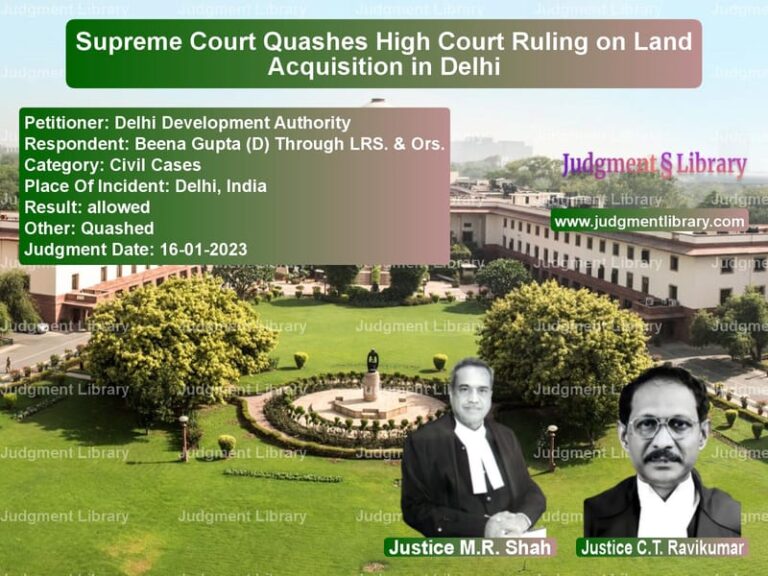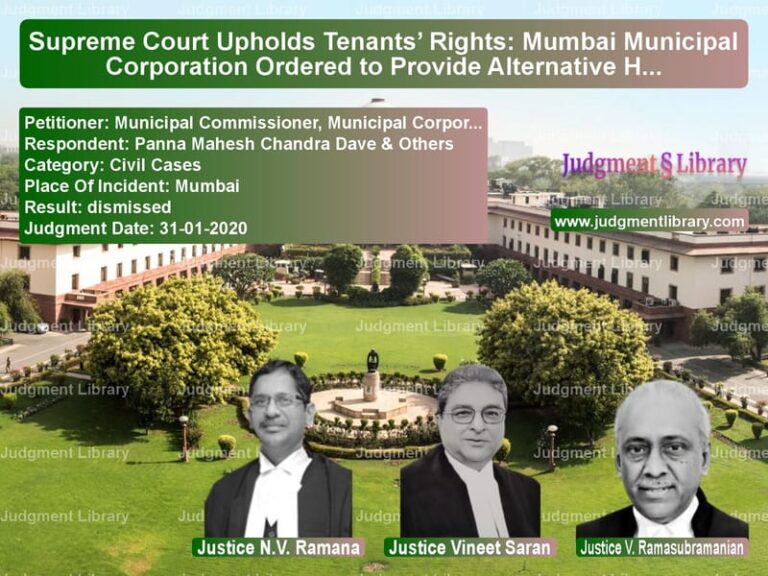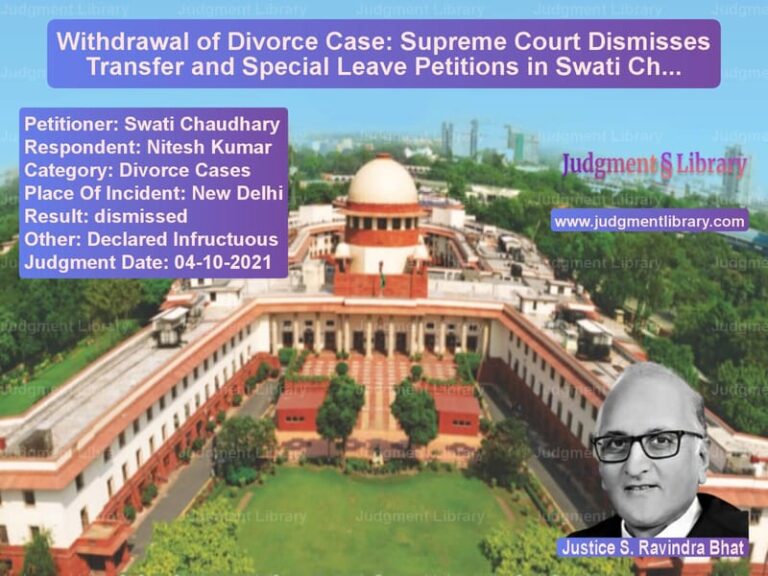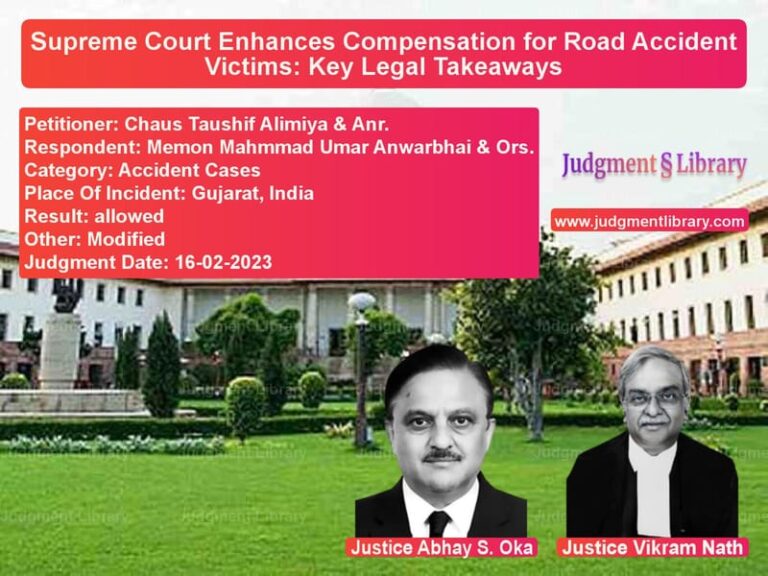Supreme Court Strikes Down Rajasthan High Court’s Blanket Bail Restrictions
The Supreme Court of India, in the case of High Court of Judicature for Rajasthan vs. The State of Rajasthan & Anr., addressed two appeals regarding controversial orders passed by the Rajasthan High Court. These orders imposed blanket restrictions on listing bail applications during the COVID-19 pandemic and prohibited arrests for offenses carrying a maximum sentence of three years. The Supreme Court ruled that these directions were beyond the jurisdiction of the High Court and infringed upon fundamental rights.
Background of the Case
The case involved two petitions for Special Leave to Appeal:
- One challenging the Rajasthan High Court’s order dated March 31, 2020, which directed the Registrar (Judicial) not to list bail applications, appeals, and suspension of sentence applications under ‘extreme urgent matters’ during the pandemic.
- The other challenging the High Court’s order dated May 17, 2021, which prohibited arrests in cases where the maximum sentence was up to three years and instructed the administration not to list anticipatory bail applications in such cases.
Legal Issues Considered
The Supreme Court examined the following key legal issues:
- Whether the High Court had the authority to issue blanket directions suspending bail applications and arrests.
- Whether these orders violated fundamental rights under Articles 14, 19, and 21 of the Constitution.
- Whether such orders interfered with the statutory framework governing criminal law.
Arguments by the Appellant (Rajasthan High Court)
The appellant (High Court of Rajasthan) argued:
- The directions were issued to prioritize public health and reduce the risk of COVID-19 spread in prisons.
- The judiciary was overwhelmed with urgent cases, and the orders aimed to streamline listing during lockdowns.
- Similar measures were taken globally to limit the exposure of inmates and court personnel.
Arguments by the Respondents (State of Rajasthan & Others)
The respondents countered:
- The Rajasthan High Court’s orders violated the right to liberty and access to justice.
- Criminal laws, including bail provisions, are governed by the Code of Criminal Procedure (CrPC), 1973, and cannot be suspended by judicial orders.
- The directions interfered with the powers of investigating agencies and lower courts.
Supreme Court’s Key Observations
1. Right to Apply for Bail is a Fundamental Right
The Court ruled that bail is an essential part of personal liberty and cannot be denied through administrative orders:
“The right of an accused to seek bail is implicit in Articles 14, 19, and 21 of the Constitution. By suspending bail applications, the Rajasthan High Court effectively suspended fundamental rights.”
2. Blanket Orders are Unconstitutional
The Supreme Court held that the Rajasthan High Court’s blanket ban on bail applications violated constitutional principles:
“It was improper for the High Court to conclude that all bail applications and appeals under SC/ST Act should not be considered as ‘extreme urgency.’ Such sweeping directions cannot override the due process of law.”
3. Encroachment on Executive Powers
The Court ruled that directing police not to arrest accused persons for offenses carrying a sentence of up to three years was beyond judicial powers:
“The power to make arrests lies with investigating agencies, governed by procedural laws. The judiciary cannot issue blanket bans on arrests.”
4. Judicial Overreach in Listing of Cases
The Supreme Court observed that only the Chief Justice has the authority to allocate and list cases:
“The orders under appeal encroached upon the administrative powers of the Chief Justice of the High Court in allocating judicial business.”
Final Judgment
The Supreme Court:
- Struck down the Rajasthan High Court’s orders dated March 31, 2020, and May 17, 2021.
- Restored the right of accused persons to apply for bail without restrictions.
- Declared that judicial listing and case allocation must remain under the Chief Justice’s authority.
- Reaffirmed that courts cannot suspend statutory provisions through blanket directions.
Implications of the Judgment
1. Reinforcing Fundamental Rights
The ruling ensures that courts cannot impose blanket restrictions on access to justice, reinforcing the right to a fair trial.
2. Limiting Judicial Overreach
The judgment reaffirms that the judiciary cannot assume executive functions, such as directing law enforcement on arrest policies.
3. Ensuring Accountability in Case Management
The ruling clarifies that only the Chief Justice has the power to manage case listings, ensuring judicial discipline and efficiency.
4. Protecting the Rights of Undertrial Prisoners
By striking down the Rajasthan High Court’s orders, the Supreme Court prevents unnecessary delays in bail hearings, benefiting undertrial prisoners.
Conclusion
The Supreme Court’s decision in High Court of Judicature for Rajasthan vs. The State of Rajasthan & Anr. is a landmark ruling that upholds constitutional rights and judicial propriety. By striking down blanket bail restrictions and prohibiting judicial overreach, the Court reaffirmed its commitment to protecting the right to liberty and ensuring judicial accountability.
Petitioner Name: High Court of Judicature for Rajasthan.Respondent Name: The State of Rajasthan & Anr..Judgment By: Justice L. Nageswara Rao, Justice Aniruddha Bose.Place Of Incident: Rajasthan.Judgment Date: 29-09-2021.
Don’t miss out on the full details! Download the complete judgment in PDF format below and gain valuable insights instantly!
Download Judgment: high-court-of-judica-vs-the-state-of-rajasth-supreme-court-of-india-judgment-dated-29-09-2021.pdf
Directly Download Judgment: Directly download this Judgment
See all petitions in Bail and Anticipatory Bail
See all petitions in Custodial Deaths and Police Misconduct
See all petitions in SC/ST Act Case
See all petitions in Fundamental Rights
See all petitions in Judgment by L. Nageswara Rao
See all petitions in Judgment by Aniruddha Bose
See all petitions in allowed
See all petitions in Quashed
See all petitions in supreme court of India judgments September 2021
See all petitions in 2021 judgments
See all posts in Criminal Cases Category
See all allowed petitions in Criminal Cases Category
See all Dismissed petitions in Criminal Cases Category
See all partially allowed petitions in Criminal Cases Category







